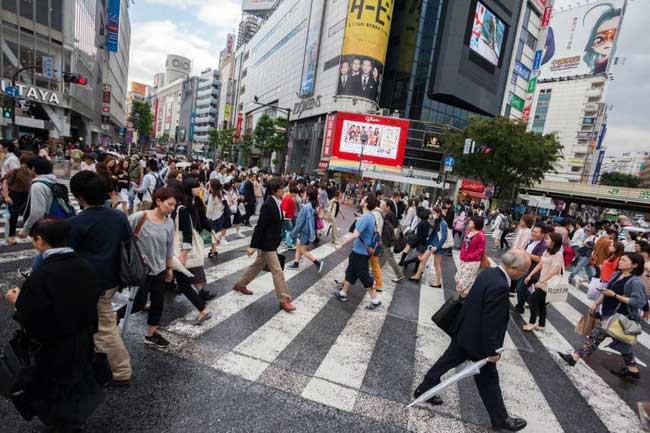Twenty years ago, trash bins were scattered throughout the streets of Japan. However, even in their absence, Japanese streets remain remarkably clean. The reason behind this has garnered admiration worldwide.
When visiting Japan, many tourists are often surprised to find themselves searching high and low for a public trash bin. Throughout the streets, one can see vending machines lining the sidewalks and separate containers for can disposal, but trash bins are nowhere to be found. What is truly remarkable is that despite the lack of trash bins and fewer sanitation workers, this country is consistently ranked among the cleanest in the world.
The answer may surprise many:
1. Risk Mitigation
In fact, trash bins have only been absent in this country for about 20 years; prior to that, they were commonplace on Japanese streets. However, the sarin gas attack on the Tokyo subway in March 1995 led to the removal of most public trash bins from Japan’s cities. The attackers, part of the Aum Shinrikyo cult, used plastic bags wrapped in newspaper to create a mechanism for dispersing the colorless, odorless poison. The incident resulted in 13 deaths and over 1,000 injuries due to exposure to the chemical toxin.

Trash bins have only been absent in Japan for about 20 years. (Image: Internet).
Following this incident, the Japanese began to fear strange objects appearing at train stations. As a result, trash bins were systematically removed as they could potentially conceal various types of terrorist weapons. Gradually, they also disappeared from streets and other public places.
Similar measures taken after the incident have been adopted in many places, such as New York and Boston in the United States, where temporary trash bins were removed from city streets and stations to mitigate public concern.
2. Public Awareness
The effort to alleviate public fear is the main reason why trash bins have yet to make a comeback on Japanese streets. However, this has not significantly impacted the daily lives of citizens or environmental issues in the Land of the Rising Sun.
In Japanese culture, cleanliness is considered a manifestation of respect, and both adults and children are highly conscious of maintaining clean spaces. Additionally, due to limited space, small landfills, and waste processing facilities, the country has implemented several strategies to reduce waste, resulting in per capita waste and recycling rates that are only half of those in the United States and the United Kingdom.

In Japan, everyone is highly aware of maintaining clean spaces. (Image: Internet).
The absence of trash bins has forced citizens to adopt more creative waste disposal methods. Japanese people will carry their trash in their bags and wait until they get home to dispose of it. Public restrooms have also eliminated paper towels, replacing them with hand dryers or reusable cloth towels.
Smokers often carry personal ashtrays, and pet owners must dispose of their pets’ waste in toilets. There is even a public mascot named Mangetsu-man that patrols the streets to ensure that everyone is working together to keep the streets clean and the city green and beautiful.

The absence of trash bins has encouraged citizens to adopt more creative waste disposal methods. (Image: Internet).
Japan places great importance on waste management and maintains strict regulations on how waste is disposed of daily. While many places around the world only separate paper and plastic, Japan sorts its waste into various categories such as glass bottles, cans, combustible, non-combustible, and plastics. Failure to do so may result in their waste not being collected.
Trash Bins Gradually Returning to the Public
Although they may be hard to find, there are still some places in Japan where you can locate public trash bins if needed. With a large number of vending machines scattered throughout the streets of Japan, one often finds a small trash bin for plastic disposal placed next to them.
During the warmer months, parks are a popular and favorite recreational spot for the Japanese. Therefore, trash bins can also be found in many public parks. Alternatively, you might encounter trash bins at local convenience stores, which you can use if you purchase something.

Trash bins are slowly returning to Japan due to a tourism boom. (Image: Internet).
The booming tourism industry is also a reason driving the demand for the return of trash bins to Japanese society. “Tourism pollution” refers to the negative environmental impacts caused by increased tourism activity. This has compelled the Japanese government to reconsider the structure surrounding trash bins in public spaces, especially in areas experiencing a tourism surge.
There are several ways to reintroduce trash bins to the streets of Japan while still alleviating public concerns and helping to address waste issues caused by the sudden influx of tourists.
Transparency is a highly regarded approach: People will use transparent plastic bags inside see-through trash bins. This allows both citizens and authorities to quickly identify the contents of the trash bags. Additionally, placing trash bins within the line of sight of train station staff ensures that any suspicious activity can be quickly detected and addressed. The picturesque Omotesando Avenue in Tokyo is even testing blast-resistant trash bins for potential future use.


















































